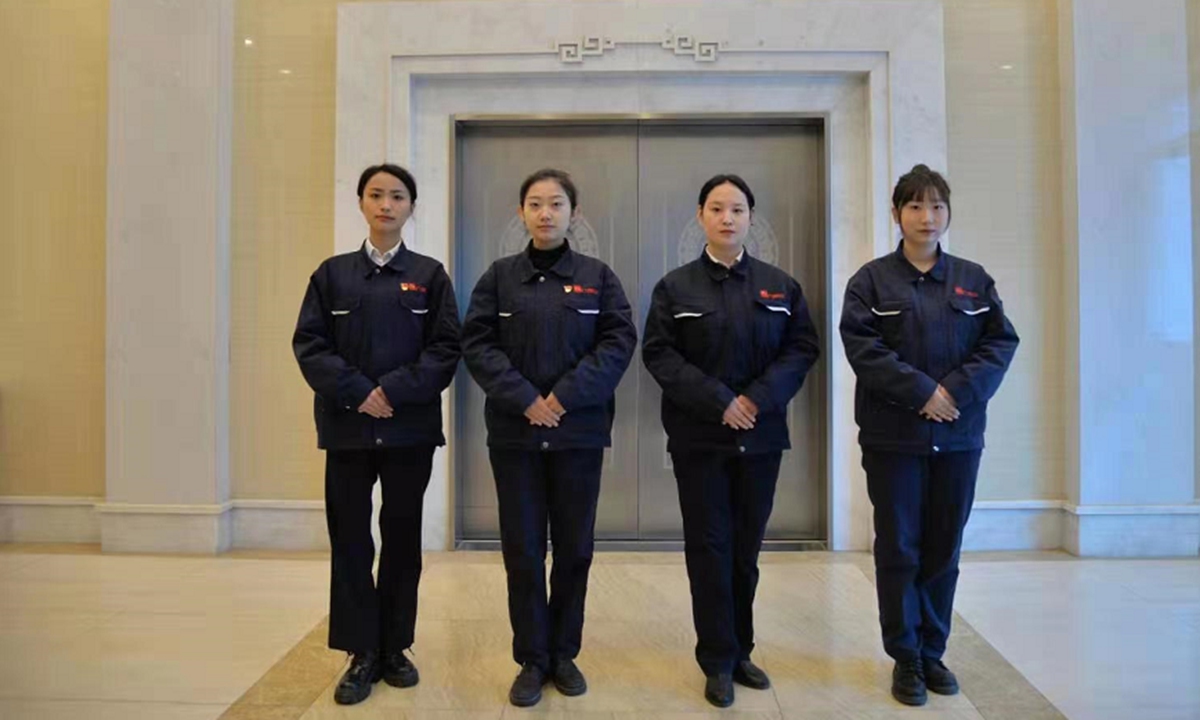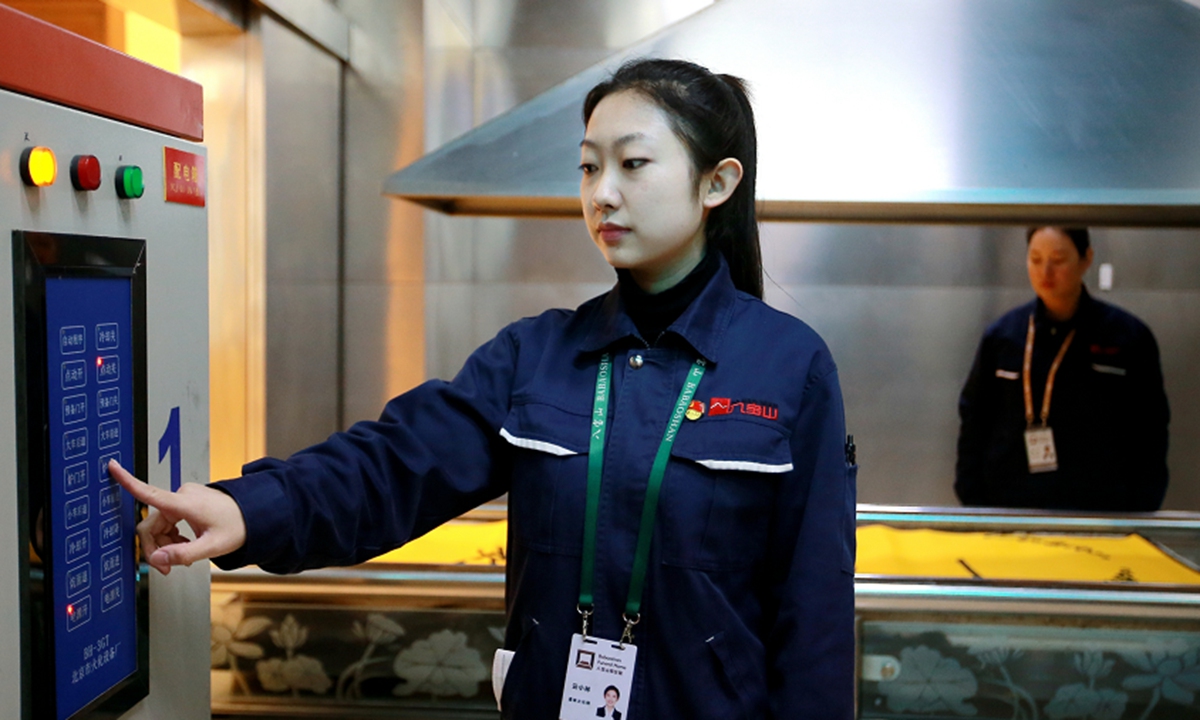What is like to be the women funeral workers in China? First all-woman crematorium crew in Beijing provides an answer

The crematorium technician team in Beijing Photo:Courtesy of Yun
"The purpose of my job is not to convince people to not fear death, in fact it is just the opposite : to face this fear that drives us to cherish the present time we have with our loved ones even more," Yun Xiaolin, a crematorium technician in Beijing, told the Global Times.The 24-year-old Yun, a former flight attendant who can be seen wearing pink lipstick and hoop earrings in her holiday photos, is one of four women running the Babaoshan Funeral Home - a major funeral center in Beijing. Every day, the adorn their solemn navy blue work wear to keep their promise to be the first all-woman crematorium team in Beijing.
Roses of fire
The new team, which debuted at the end of March, consists of other three women in their mid-20s - Yao Ziqing, Liu Dejie and Dong Ning. They have been given a nickname of "fire rose" to represent the fact they are the first such crew made up entirely of women in the past 20 years.
The "fire rose" team has emerged as a niche group in this traditionally male-dominated funeral industry, which has in recent years seen a growing number of young women taking up the profession. Their inborn feminine strengths such as caring natures and compassion have allowed them to be trusted by more clients dealing with tearful losses.
"Some clients only want female technicians because we can show warmth while still being professional. For example, we know how to operate the machine and also know when to hand over a tissue; that comes from instinct," said Yun.
The four technicians handle around 70 cases per day. According to Yun, work is usually packed before 2 pm so she arrives to work at 6 am to take an hour to clean and prepare the equipment.
In addition to a hefty workload, running a crematorium is far more than turning on and off a cremator, Yun noted. A crematorium worker needs to oversee a multitude of responsibilities such as machine repair and environmentally friendly disposal of remains.
"The crematorium work is not only physical work, but highly technical," said Wei Tong, director of the department. "What we want most is for women to work in this field as equally as men."
Feelings allowed
The team in Beijing is just one example of the growing presence of women professionals in China's funeral industry.
Sixi, whose brief self introduction on Chinese social media platforms is "a post-1995 server in the funeral industry," also shared her experiences working in this industry that deals with death on a daily basis with the Global Times on Sunday.
Unlike Yun, who said she chose the work due to her curiosity, Sixi ended up in the profession since her family works in the funeral industry. After graduating from university, she chose to follow in the footsteps of her family members and work in a funeral parlor in North China's Tianjin Municipality.
Generally speaking, accompanying a person on their last journey involves a three-day process that begins with picking the body up.
"I neaten the bodies' appearance, help familiarize relatives of the deceased with the funeral rituals and arrange the mourning hall," Sixi said, discussing the details of her job.
Sixi recalled a young woman who just gave birth to a baby.
"After giving birth, she had headaches but did not get enough care from her mother-in-law. Then she had a fever, and after a few days the hospital discovered she had actually suffered a cerebral hemorrhage. It was too late."
Knowing the woman left behind an 8-day-old child, Sixi couldn't help bursting into tears when the woman's sister-in-law showed her a photo of the infant at the funeral.
"When you have a child, you cannot hear anything sadder about children," Sixi explained.
Similar to Sixi, Yun recalled her most unforgettable experience during her internship with a lump in her throat. Once a couple who had lost their 4-year-old child begged the technicians to do all they could to get them the child's ashes, which would be few since the child was very small.
"The technician had to wipe all around the space to get merely a handful of ashes for the parents," said Yun.
"The moment they took it, I saw the sign of relief on their faces, which made me believe the job I do is meaningful."
"I have been maturing due to this work. At the beginning, I was only able to handle bodies that had died of natural causes, but now I can deal with most situations."
New views on taboos
While women working in the industry is still considered by many as a social taboo, the four all noted that this uncommon profession taught them how the inevitability of death can actually be a positive force that encourages people to cherish life.
They have also noticed that there are fewer stereotypes about the funeral industry today, especially when it comes to the women workers.
Sixi noted she has not encountered much prejudice during her work. Instead, many people are surprised and express respect when hearing that Sixi can handle tough works skillfully in her job, a profession that many people in China are afraid to come into contact with.
She likes sharing touching stories and her thoughts on social media start-up Xiaohongshu under the handle "Sixi henmang" (lit: Sixi is busy) as "I want to show people what a huge treasure they have, which is their life."
Along with their efforts is a changing social environment led by new directions and social institutions in the industry, which have encouraged more people to no longer be wary of this profession.
In 2015, the Beijing Society Administration Vocational Institute redefined their funeral education department as China's first college teaching "life culture." The new setting teaches students, among whom were the four fire roses, a contemporary approach to the funeral profession by providing lectures on topics such as social services and the philosophy of death as well as teaching psychology courses.
The Babaoshan Funeral Home also holds open days, during which time it holds life culture-related exhibitions and educational lectures for the public.
"We guard people's life, no different than doctors," Yun noted. "We are the ferrymen of their souls."

Crematorium technician Yun Xiaolin in Beijing Photo:Courtesy of Yun

